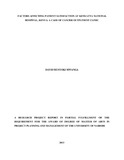Factors Affecting Patient Satisfaction At Kenyatta National Hospital, Kenya: A Case Of Cancer Outpatient Clinic
Abstract
The purpose of this study was to examine factors affecting patient satisfaction at KNH. The
objectives of the study were to establish how the factors: physical environment, technical quality,
interpersonal relations and the accessibility of care affects patient satisfaction. A descriptive
survey design utilizing quantitative research method was adopted. The target population was all
1010 patients in the month of May 2013. A sample size of 101 patients was sampled using
systematic sampling method. The data collection was done using a structured self administered
questionnaire with five point’s likert scale. 75% of the patients sampled were on radiotherapy
treatment, 10% on the chemotherapy, 105 on follow up after treatment and 6% were being
diagnosed to determine mode treatment to apply. The data was analyzed using statistical package
for social sciences (SPSS) version 12.0. The study unveiled that 61.8% of the respondents were
satisfied with physical environment aspect of care although 89.9% and 60.7% of the respondents
said the clinic was crowded and the toilets were dirty respectively. The respondents rated
technical quality at 64.8% with 41.6% saying the doctors rarely gave them advice about their
medical conditions. The interpersonal relation was rated highly at 81.9% with 32.6% saying there
were no brochures explaining operations of the clinic. Communication was rated at 62% with
30.3% of the respondents saying they were not involved in making decisions about treatment and
care. Accessibility to care was rated at 61.4% with 33.7% of the respondents saying they were
delayed waiting for the doctor to arrive at the clinic. The overall satisfaction rating of the services
at the Cancer Treatment Centre was of 64.9%. The study recommends to the KNH management
to improve of cleanliness in the toilets, make waiting areas conducive for patients and improve
signage to make easy for people to access different service points of care around the hospital;
improve availability of diagnostic equipment and machines, train the machine operators and
technicians on handling and maintenance as well as employing additional staff, encouraged staff
to have good attitude towards patients and their relatives. Improve communication to create more
understanding between all the parties. Counseling should be encouraged to prevent the patients,
relatives and friends from anxiety and fear. Encourage provision of information on operation of
the clinic through posters, brochures, magazines and books at the waiting areas and notice
boards. The government should subsidize cancer drugs and laboratory reagents to reduce the cost
of cancer treatment and make it affordable to the poor and marginalized Kenyans. The cancer
treatment facilities should be decentralized to all the counties to make it easier for patients to
access treatment services. More facilities should be considered in Central region which
according to this study has high preference of cancer incidences. In conclusion patient
satisfaction surveys are cost effective way to evaluate the healthcare quality provided to patients.
They form platform for identifying and address barriers that hinder healthcare provision and
encourage care givers embrace patient centred care, improvement of accessibility to care by
increasing the time spent in consultation and the operation of the health facility.
Citation
David Musyoki Mwanga. 2013. Factors Affecting Patient Satisfaction At Kenyatta National Hospital, Kenya: A Case Of Cancer Outpatient Clinic. A Research Project Report In Partial Fulfillment Of The Requirement For The Award Of Degree Of Master Of Arts In Project Planning And Management Of The University Of Nairobi.Publisher
University of Nairobi, Department of Education Administration & Planning
Collections
- Faculty of Education (FEd) [5979]

